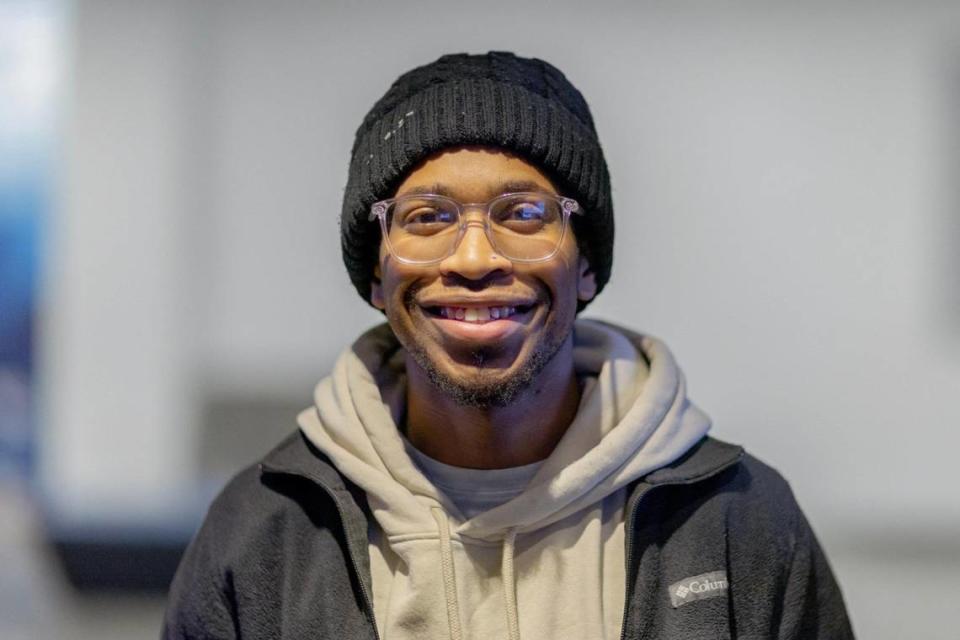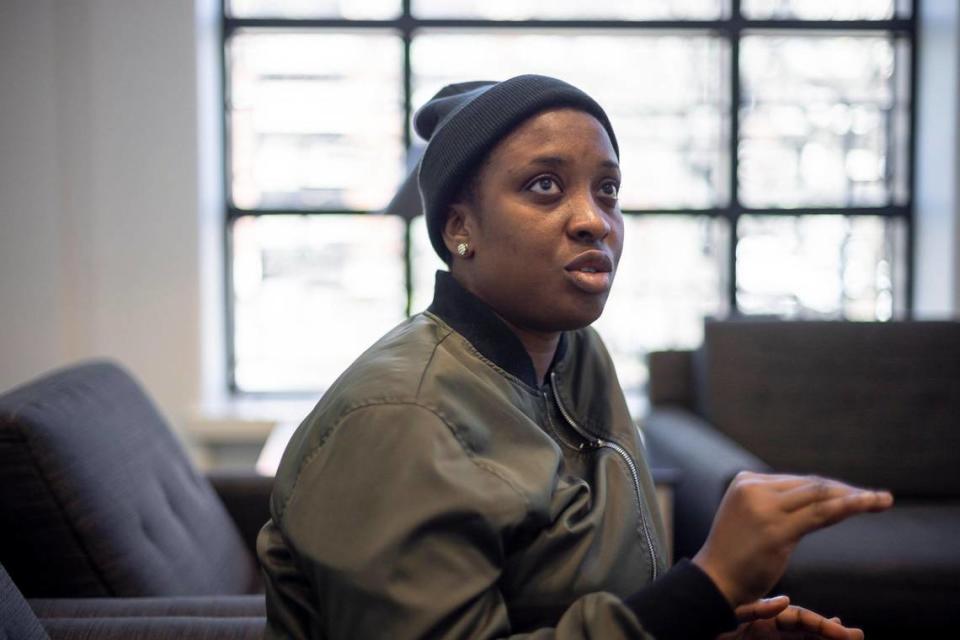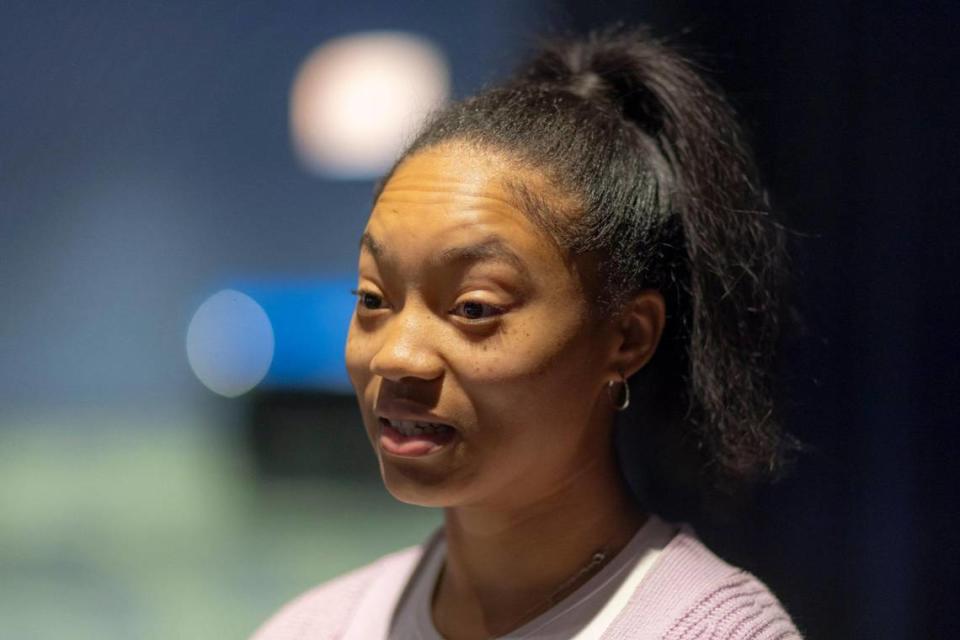As Kentucky lawmakers go after college DEI, Black UK students share their own experiences
For many Black students choosing where they want to go to college, a diverse and welcoming environment is top priority.
Attending a state university, like the University of Kentucky, can bring opportunities like scholarships and organizations for minority students. But choosing a predominantly white university also brings challenges or instances of racism on campus.
Still, Black students interviewed by the Herald-Leader said they had found UK to be an overall positive experience.
“If you want to see change, you’ve got to make it, and by going here, you’re starting that chain reaction,” said Brandy Jackson, a senior.
Isaiah Henderson, a senior from Chicago, said he felt part of the UK community from his first week in Lexington.
“As soon as you walk on campus, people are welcoming you,” Henderson said.
He chose to leave Chicago and come to UK in search of new experiences. He picked UK because of the campus environment and on-campus opportunities for freshmen, he said. He felt a “sense of home” at UK.

UK has 33,885 students enrolled as of the fall 2023 semester. It’s the largest-ever enrollment for UK, and the most diverse: nearly 17% of students enrolled are from underrepresented populations, the university said last fall.
“At UK, we work every day to model a community where everyone belongs and everyone feels accepted for who they are and what they, uniquely, contribute to this place,” President Eli Capilouto said last fall.
Black students make up 6.9% of the UK population, the largest minority population at UK, according to university data. The number of Black students increased from 1,997 in the fall 2014 semester to 2,345 in fall 2024.
Campus environment: ‘Make the best of it’
Henderson, who is president of the Black Student Union, said his experience has been positive. He’s found a sense of community through organizations like the Black Student Union and his fraternity, the Epsilon Chi chapter of Alpha Phi Alpha, a historically Black fraternity which has existed at UK since 1965. The Black Student Union is a student organization whose goal is to “help Black students find a sense of community,” Henderson said, by planning events and being active in the UK community.
Several students, including Henderson, talked about the importance of organizations at UK, specifically the Martin Luther King Center, which works with students from all backgrounds and hosts events centered around cultural awareness, leadership and community.
But it hasn’t been a perfect college experience, students said. Henderson said more funding for student organizations would have made outreach and growing the groups he’s involved with easier.
For Jackson, the university’s response to certain incidents, like when a white student physically attacked and used racial slurs toward a Black student in 2022, could have been stronger.
Still, Jackson said she would recommend UK to Black students making a decision on where to go to college.
“I had a positive experience here,” Jackson said. “I think it’s probably one of those situations where you’ve got to make the best of it, and to really make a good, positive, loving, supportive community here.”
Joy Jerome, a first-year graduate student from Nigeria, said she was able to connect with other Nigerian and international students via social media before she started at UK. Once she arrived on campus, they were the ones who helped her find her way.
“I really feel at home here,” Jerome said. “I really love UK.”

Sophia Rosing incident ‘shook the Black community’
In fall 2022, the UK community was shaken when an intoxicated student, Sophia Rosing, physically assaulted and spouted racial slurs at a student desk clerk, Kylah Spring. Spring, who is Black, was working at the front desk of Boyd Hall at the time.
Video of Rosing’s attack and arrest went viral, making headlines around the world and putting a spotlight on UK.
Rosing, a white student, entered Boyd Hall and began taunting, using racial slurs and making derogatory comments toward Spring. After police arrived, Rosing continued using slurs, resisted arrest and bit a police officer, according to the arrest report.
“It was definitely an event that shook the Black community as a whole here at UK,” Henderson said. “Personally, I’ve experienced my fair share of racism being here at the University of Kentucky, and just seeing that broke my heart.”
Rosing was arrested and charged with first and second offenses of public intoxication, third-degree assault of a police officer, fourth-degree assault and second-degree disorderly conduct. She was banned from campus, and withdrew from UK shortly after being arrested. Rosing was indicted by a grand jury last February and has a status hearing scheduled for March 1 in Fayette County Circuit Court.
While she doesn’t know either of the students involved, Jackson said it was “heartbreaking” to see how some people reacted to the incident and were “defending the physicality and defending the situation.”
“It is hard being a Black student at the University of Kentucky,” Jackson said.
“It’s difficult because you know there’s always going to be that prejudice or (stigmas) or stereotypes that surround you solely for the color of your skin. But it’s not always in your face at the University of Kentucky, but that just made it at the forefront. It was the topic on everybody’s mind, and that’s when you can really see a lot of people’s true feelings.”

Jackson said she thought the university responded as well as they could with the processes they have in place. But she said they left one question unanswered: “Where do we go from here?”
“It was very emotional for a lot of people at the end of the day,” Jackson said. “Right is right and wrong is wrong. But it was definitely difficult having to go to class and just go about your daily life because everybody was talking about it.”
Following Rosing’s arrest in 2022, and a march organized by Black students at UK, the university reaffirmed its intention to remove a controversial mural located in Memorial Hall. The mural depicts Black workers who are possibly slaves planting tobacco and a Native American holding a tomahawk.
The announcement came after years of back-and-forth with students, a lawsuit and protests surrounding the content of the mural. In recent years, students organized protests and called for more on-campus opportunities for Black students, along with the removal of the mural.
However, in 2020, Kentucky poet Wendell Berry sued UK to stop the removal of the mural. The lawsuit is ongoing, which has paused UK’s efforts.
GOP lawmakers target DEI in Kentucky
Several students said they found community through events and organizations that are focused on diversity at UK, like the Martin Luther King Center. Scholarships for minority students also made attending UK an easier choice, they said.
Multiple bills introduced in the Kentucky legislature could halt diversity, equity and inclusion, commonly called DEI, initiatives at UK and other public universities.
Senate Bill 6 from Sen. Mike Wilson, R-Bowling Green, would block all DEI initiatives that promote so-called “discriminatory concepts.” It was passed by the Senate, and now goes to the House of Representatives for a vote.
House Bill 9 from Rep. Jennifer Decker, R-Waddy, would force public colleges and universities to dismantle and defund DEI offices and positions. Several amendments to the bill have been filed, though it has not yet passed out of the House as of Feb. 20.
“I think it’s an insensitive bill,” Henderson said. “Just thinking of some of the backgrounds Black students come from, not all Black students have the resources or the opportunities that other students may have, even if they are in the same impoverished tax bracket. Most of the time, Black students are discriminated against, and they aren’t offered the same opportunities just because of the color of their skin.”
Capilouto, in a rare public rebuke of state legislators, called the bills “deeply concerning” and opposed both DEI bills, along with a bill that would affect the university tenure process.
UK president to legislature: Proposed DEI, tenure legislation is ‘deeply concerning’
“We don’t speak out as an institution on public policy unless the issues will impact our entire community in potentially significant ways,” Capilouto wrote in a campus-wide email on Feb. 14. “This is one of those moments. Let’s not extinguish the thirst for knowledge because certain questions aren’t allowed because they are uncomfortable or challenging.”
The university’s work towards supporting students of color should be valued and supported, not undermined, he said.

When asked about the DEI bills earlier this month, UK spokesperson Jay Blanton said it was too early in the legislative process to comment on potential impacts of the bills.
Most students interact with DEI initiatives through their individual colleges and programs at UK. The Office for Institutional Diversity has 20 employees. Other offices on campus also serve as hubs for students to have access to events, programming and opportunities related to DEI, Blanton said.
“I think it’s hard enough to be a minority student, a Black student, at the University of Kentucky,” Jackson said. “I think the DEI office, especially at the College of Communication, is very impactful for students, and always trying to put on events and make things more accessible. I don’t think it’s doing any harm. I think if anything, it’s creating more positive change on campus.”
Other students, including freshmen Zane Marshall and Jaren Burge, said they weren’t familiar with the recent DEI legislation, but didn’t necessarily think it was a bad thing.
“I couldn’t care too much for it,” Burge said. “For me, everybody has their own equal chance.”
“I feel like everybody gets their chances,” Marshall said.
If race-based scholarships were no longer allowed in Kentucky, Jackson said she worries about how she would be able to pay for college. By taking away programs that help minority students, Jackson said it creates more barriers to education in the state.
“It just makes it a lot harder for them to get an education,” Jackson said. “As we know, education is very important to being a successful member of society. … Most jobs now, you need a college degree. It’s going to make it way harder for students to just get these opportunities.”


